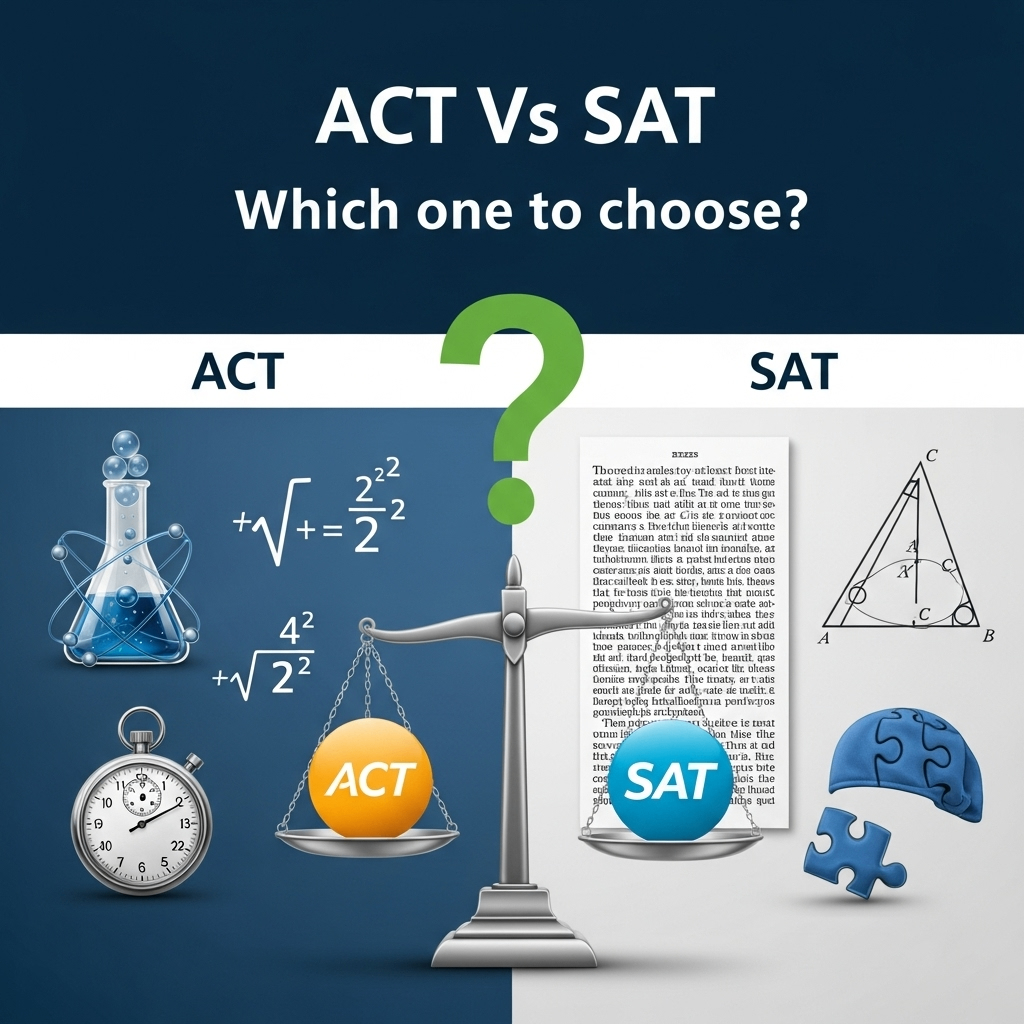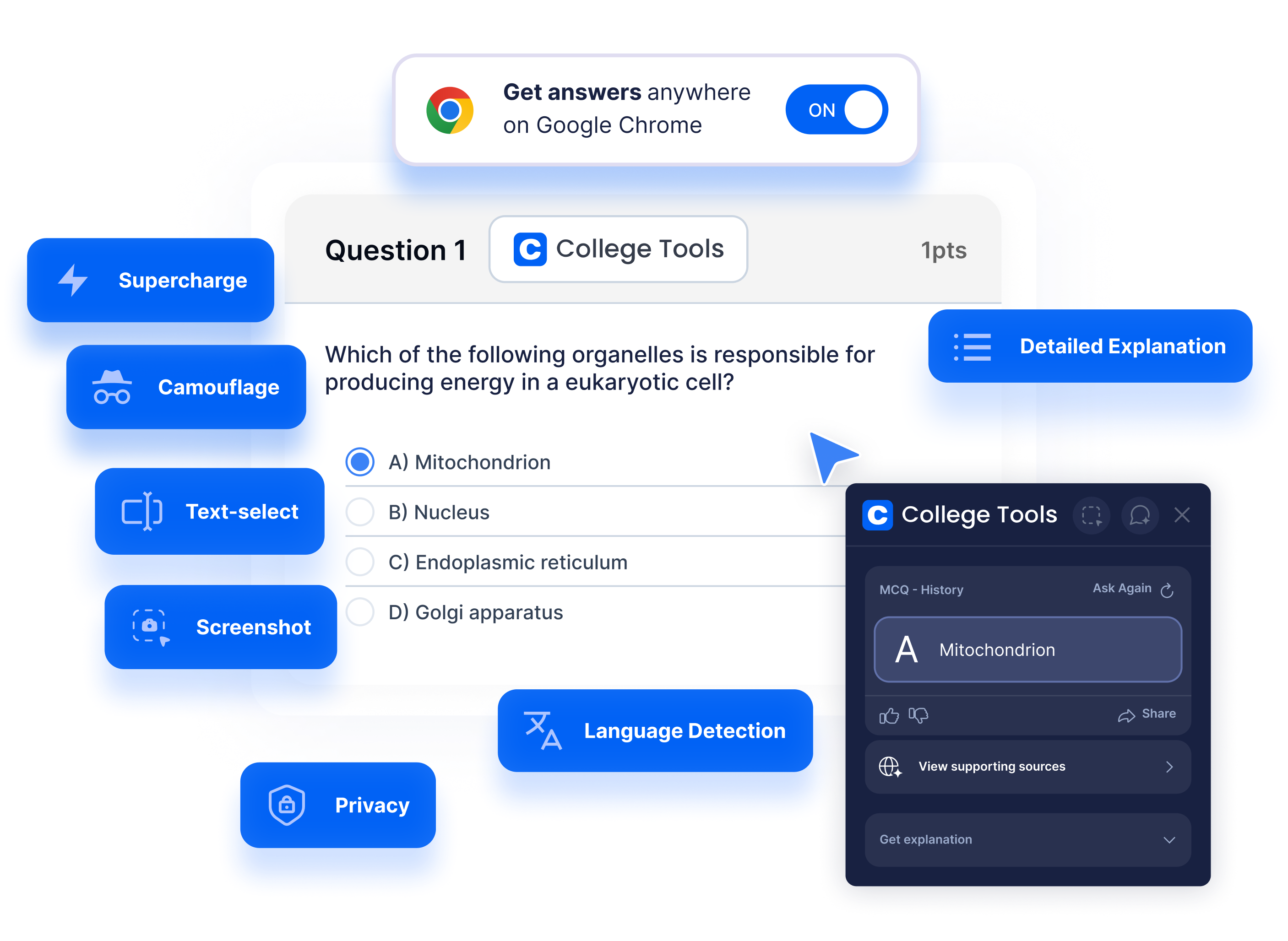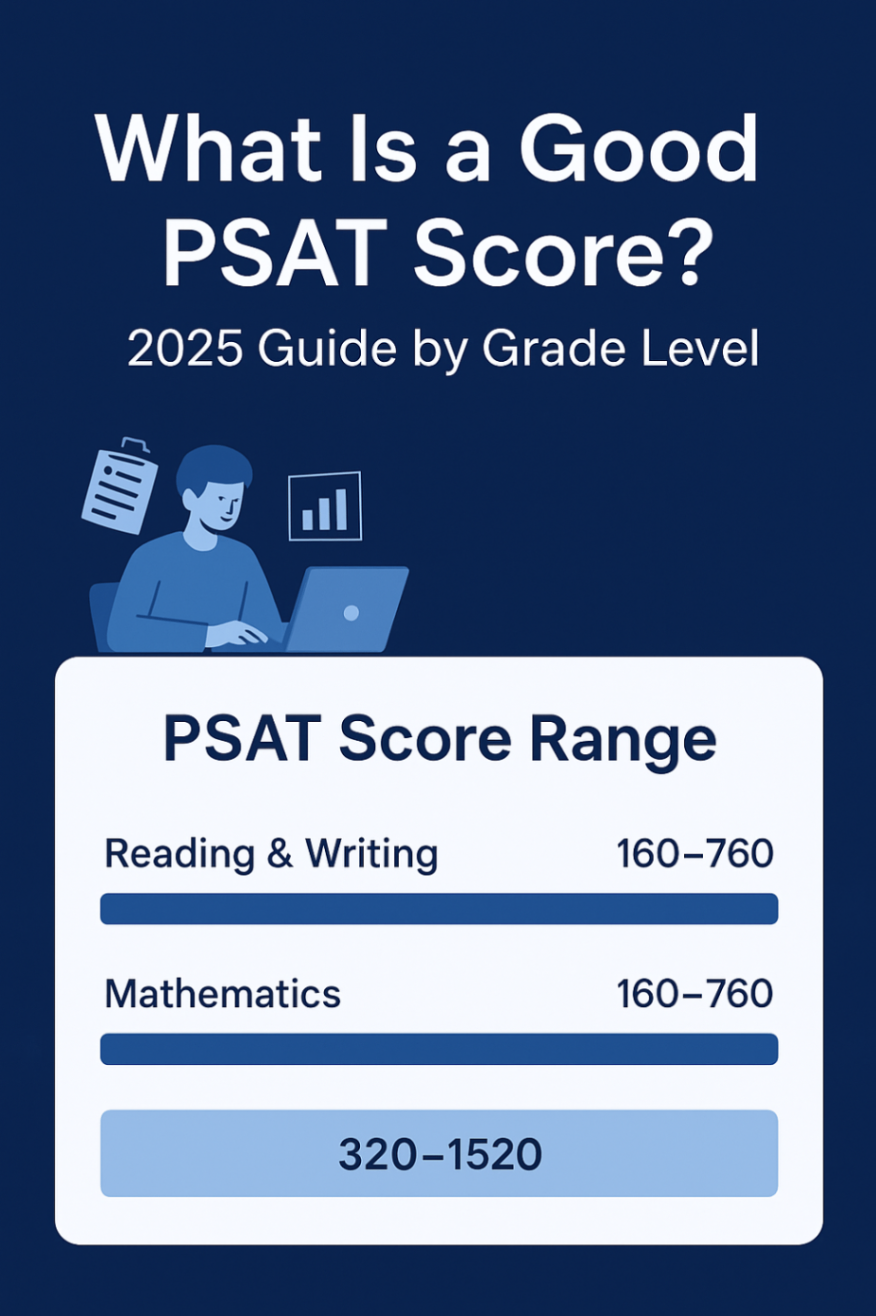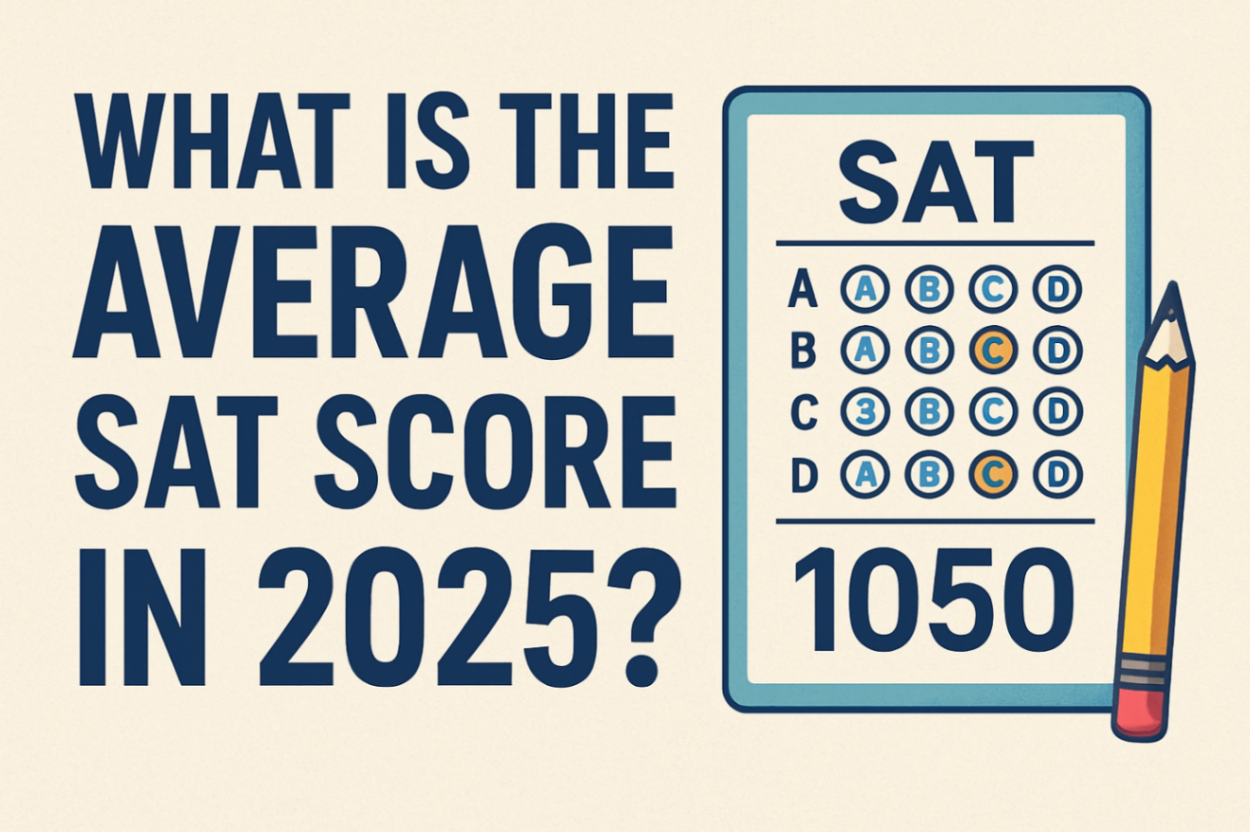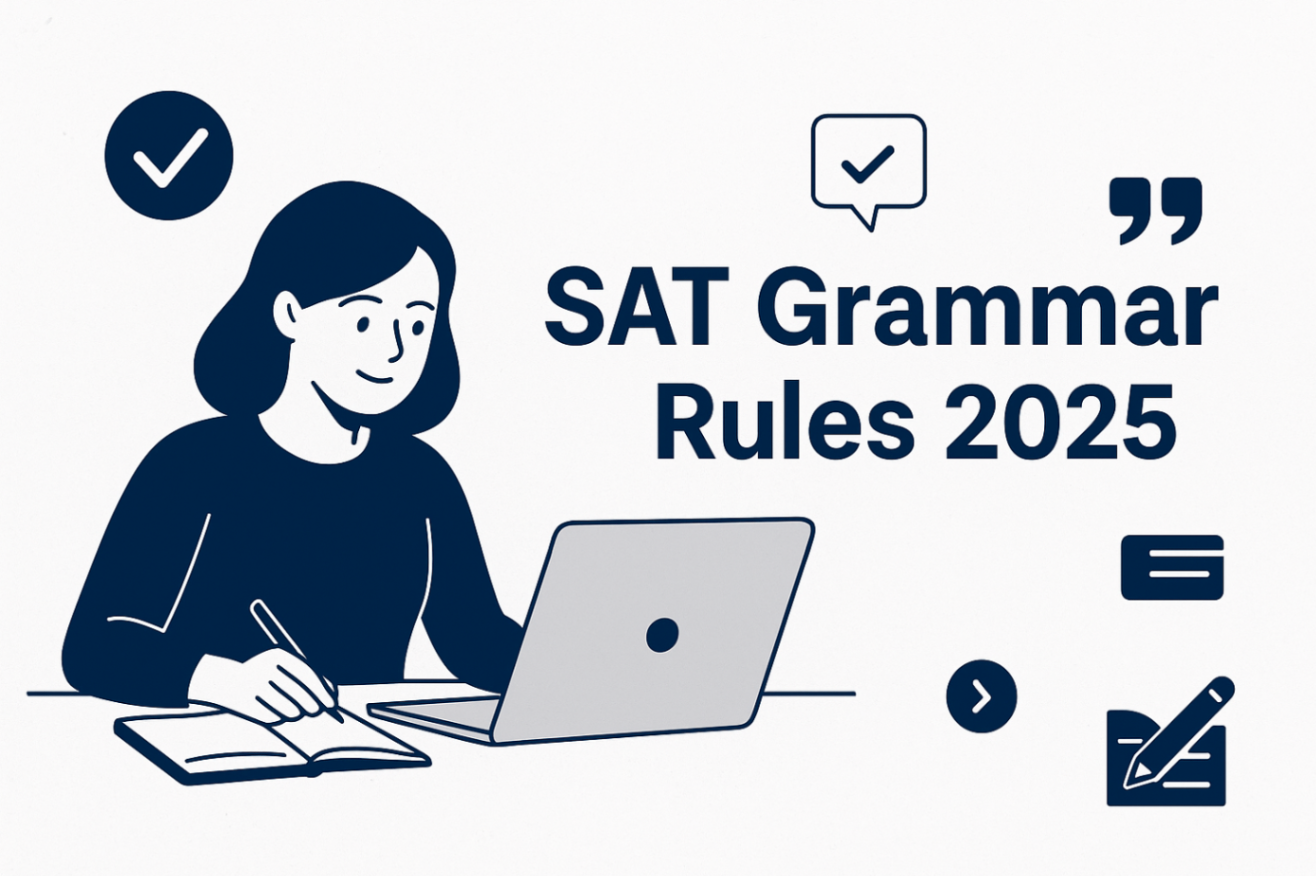Table of contents
- Understanding the ACT vs SAT Test Formats
- ACT vs SAT Scores: Understanding the Differences
- SAT vs ACT: Which is Easier?
- Key Differences: SAT vs ACT Comparison
- ACT vs SAT Comparison: College Acceptance
- ACT vs SAT Differences in Preparation
- Cost Comparison: SAT vs ACT Test
- Making Your Decision: ACT Test vs SAT
- Conclusion: Making the Right Choice in ACT vs SAT
Choosing between the ACT vs SAT can be one of the most important decisions in your college preparation journey. Both standardized tests are widely accepted by colleges across the United States, but understanding their key differences can help you determine which test aligns better with your strengths and testing style. Whether you're looking at SAT vs ACT scores, test formats, or difficulty levels, this comprehensive guide will help you make an informed decision.
For students who need additional practice and preparation, utilizing specialized tools like our SAT Question Solver can provide targeted support to improve your test performance.
Understanding the ACT vs SAT Test Formats
The fundamental difference between the ACT vs SAT test lies in their structure and approach to measuring college readiness. Both exams assess similar academic skills but use different methodologies and content organization.
Before diving into the specific test formats, it's important to understand performance benchmarks. Learning about what is the average SAT score can help you set realistic goals and benchmark your performance against national standards.
SAT Test Structure
The SAT test vs ACT test comparison reveals significant structural differences. The SAT is a digital, adaptive test lasting 2 hours and 14 minutes. It consists of two main sections:
- Reading and Writing: 64 questions in 64 minutes
- Math: 44 questions in 70 minutes
The digital SAT adapts to your performance, adjusting question difficulty based on your responses in real-time. This adaptive format allows for more precise scoring and gives you 41% to 44% more time per question compared to the ACT.
ACT Test Structure
The ACT test vs SAT comparison shows the ACT follows a more traditional linear format. As of 2025, the ACT offers both paper and digital options, with a total testing time of approximately 2 hours and 5 minutes for the core sections:
- English: 75 questions in 45 minutes
- Math: 60 questions in 60 minutes
- Reading: 40 questions in 35 minutes
- Science: 40 questions in 35 minutes (becoming optional in 2025)
The ACT maintains a faster pace with less time per question, making time management crucial for success.
ACT vs SAT Scores: Understanding the Differences
One of the most important aspects of the SAT vs ACT comparison is understanding how scoring works for each test. The ACT vs SAT score comparison reveals fundamentally different approaches to measuring student performance.
SAT Scoring System
SAT vs ACT scores differ significantly in their scales and calculation methods:
- Total Score Range: 400-1600 points
- Section Scores: 200-800 points each for Math and Reading/Writing
- Scoring Method: No penalty for wrong answers
- Perfect Score Difficulty: Typically allows only 2-3 incorrect answers for a perfect score
ACT Scoring System
The ACT vs SAT score comparison shows the ACT uses a different approach:
- Composite Score Range: 1-36 points
- Section Scores: 1-36 points for each of the four sections
- Scoring Method: Composite score is the average of all section scores
- Perfect Score Difficulty: Allows 7-8 incorrect answers while still achieving a perfect score
SAT vs ACT Score Comparison Chart
Understanding ACT vs SAT score comparison is crucial for college applications. Here's how the scores translate:
| ACT Composite Score | SAT Total Score | Percentile |
|---|---|---|
| 36 | 1600 | 99th+ |
| 35 | 1560 | 99th+ |
| 34 | 1520 | 99th |
| 33 | 1480 | 98th |
| 32 | 1450 | 97th |
| 31 | 1420 | 95th |
| 30 | 1390 | 93rd |
| 29 | 1360 | 90th |
| 28 | 1330 | 87th |
| 27 | 1300 | 84th |
This SAT vs ACT comparison chart helps students understand how their performance on one test might translate to the other.
SAT vs ACT: Which is Easier?
The question of SAT vs ACT which is easier doesn't have a universal answer, as it depends on individual student strengths and testing preferences. However, there are key differences that make each test more suitable for different types of learners.
Factors That Make the SAT Easier for Some Students
When considering SAT vs ACT which is easier, several SAT advantages emerge:
- More Time Per Question: The SAT provides significantly more time per question, reducing time pressure
- Shorter Reading Passages: Each passage typically has one question, making it easier to focus
- Built-in Math Support: Formulas are provided, and calculators are available throughout the math section
- Adaptive Format: Questions adjust to your ability level, potentially reducing frustration
Factors That Make the ACT Easier for Some Students
The ACT vs SAT difference shows certain advantages for the ACT:
- Straightforward Questions: ACT questions tend to be more direct and less tricky
- Content-Based Approach: Tests knowledge learned in school rather than abstract reasoning
- Science Section: Provides an additional opportunity to demonstrate academic strength
- Perfect Score Accessibility: Statistically easier to achieve a perfect composite score
Key Differences: SAT vs ACT Comparison
The SAT vs ACT differences extend beyond just scoring and timing. Understanding these distinctions helps determine which test aligns better with your academic strengths.
Content Differences
The ACT vs SAT difference in content coverage is significant:
SAT Content Focus: - Evidence-based reading and writing - Advanced mathematical concepts - Data analysis and problem-solving - Integrated science reasoning within reading passages
ACT Content Focus: - English grammar and usage - Mathematical concepts through trigonometry - Reading comprehension across multiple subjects - Dedicated science reasoning section
Testing Experience Differences
The SAT vs ACT test experience varies considerably:
Digital SAT Features: - Adaptive testing technology - Built-in graphing calculator - Shorter, focused reading passages - Consistent digital format nationwide
ACT Features: - Choice of paper or digital format - Linear, non-adaptive testing - Longer reading passages with multiple questions - Optional science section (starting 2025)
ACT vs SAT Comparison: College Acceptance
Both tests enjoy equal acceptance among U.S. colleges and universities. The ACT vs SAT comparison for college admissions shows no institutional preference between the two exams.
University Acceptance Policies
The SAT vs ACT comparison reveals that over 4,000 colleges accept both tests equally, including:
- All Ivy League institutions
- Top state universities
- Liberal arts colleges
- Community colleges
- International universities
Test-Optional Policies
Many institutions have adopted test-optional policies, making the ACT vs SAT choice less critical for some students. However, submitting strong scores can still provide advantages in the admissions process.
ACT vs SAT Differences in Preparation
The preparation strategies for each test reflect the fundamental ACT vs SAT differences in format and content.
SAT Preparation Focus
Effective SAT preparation should emphasize:
- Critical thinking skills: Developing analytical reasoning abilities
- Time management: Making the most of the generous time allocation
- Digital familiarity: Practicing with the Bluebook testing application
- Adaptive strategies: Understanding how the test adjusts to your performance
ACT Preparation Focus
Successful ACT preparation requires:
- Speed and accuracy: Developing quick problem-solving skills
- Content mastery: Reviewing high school curriculum thoroughly
- Science reasoning: Practicing data interpretation and experimental analysis
- Endurance building: Preparing for the longer testing session
Cost Comparison: SAT vs ACT Test
Understanding the financial implications of the SAT vs ACT test choice helps families plan their testing strategy effectively.
SAT Costs
- Basic SAT: $60
- Late registration: Additional $30
- Score reports: $14 each after four free reports
- Additional services: Various fees for changes and rush scoring
ACT Costs
- ACT without writing: $68
- ACT with writing: $93
- Late registration: Additional $35
- Score reports: $15 each after four free reports
The ACT vs SAT difference in cost is minimal, making financial considerations less important than test fit and performance potential.
Making Your Decision: ACT Test vs SAT
Choosing between the ACT test vs SAT requires careful consideration of your individual strengths, preferences, and college goals.
Take Practice Tests
The most effective way to determine your preference in the SAT vs ACT comparison is to take full-length practice tests for both exams. This hands-on experience reveals:
- Which format feels more comfortable
- Where your natural strengths lie
- How you handle different time pressures
- Which scoring system works in your favor
Consider Your Academic Strengths
The ACT vs SAT difference in content emphasis should align with your academic profile:
Choose the SAT if you: - Excel at critical thinking and reasoning - Prefer having more time to work through problems - Struggle with fast-paced testing environments - Want to avoid a separate science section
Choose the ACT if you: - Work well under time pressure - Have strong science reasoning skills - Prefer straightforward, content-based questions - Want the flexibility of paper or digital testing
Conclusion: Making the Right Choice in ACT vs SAT
The decision between ACT vs SAT ultimately comes down to which test better showcases your academic abilities and aligns with your testing style. Both exams serve the same purpose—demonstrating college readiness—but take different approaches to measurement.
Remember that success on either test depends more on thorough preparation than the specific exam chosen. Whether you select the SAT vs ACT, focus on understanding the test format, practicing consistently, and developing effective test-taking strategies.
The most important factor in the SAT vs ACT comparison is finding the test that allows you to perform at your highest level. Take practice tests, consider your academic strengths, and choose the exam that feels like the better fit for your college admissions journey.
With proper preparation and the right test choice, you'll be well-positioned to achieve scores that support your college goals and demonstrate your academic potential to admissions committees.
Frequently Asked Questions
Can I take both the ACT and SAT?
Yes, many students take both tests to determine which produces better scores. The SAT vs ACT comparison often becomes clearer after experiencing both testing formats firsthand.
Which test do colleges prefer?
Colleges show no preference between the ACT vs SAT. The SAT vs ACT comparison for college admissions reveals equal acceptance and consideration at all institutions.
How do I convert my ACT score to SAT?
Use the official concordance tables for ACT vs SAT score comparison. These tables provide equivalent scores but remember that concorded scores are not perfect predictions of performance on the other test.
Is the science section on the ACT actually about science?
The ACT science section focuses more on data interpretation and reasoning than scientific knowledge. It's essentially an applied reading comprehension section that analyzes charts, graphs, and experimental data.
Should I take the optional ACT writing test?
Consider your intended major and target colleges when deciding about the optional writing section. Some programs, particularly in English and humanities, may value writing scores more highly.

